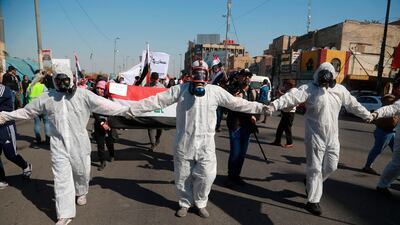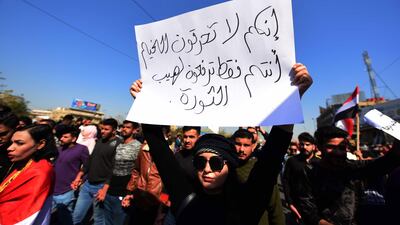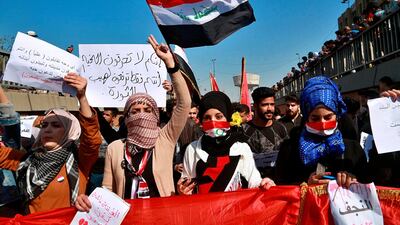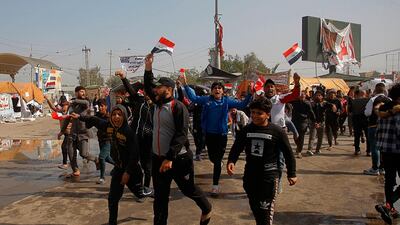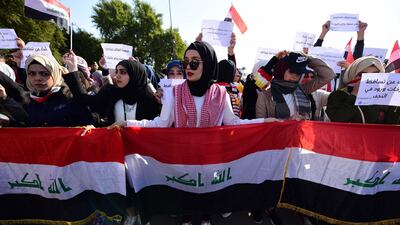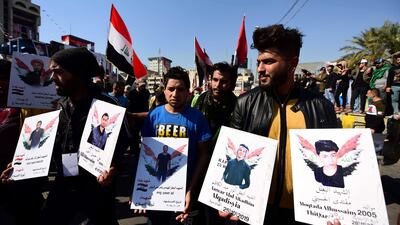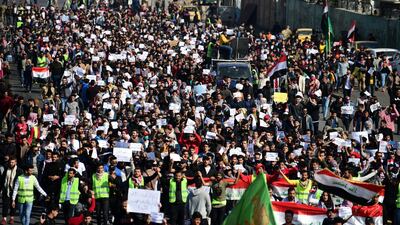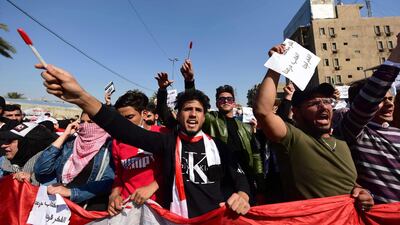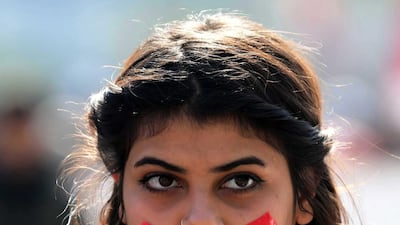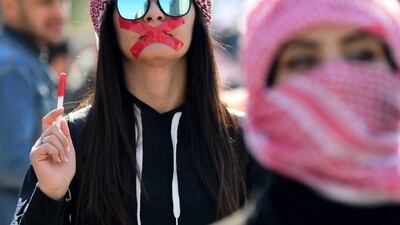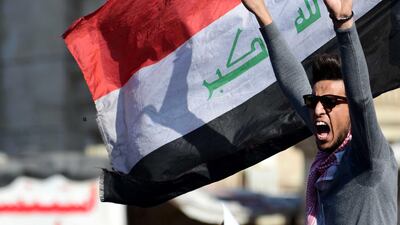Iraq's top Shiite cleric on Friday criticised security forces for not doing more to prevent attacks on anti-government demonstrators, as new figures showed about 550 people have been killed in clashes since October.
The new death toll was released by the Iraqi Human Rights Commission. Iraq's health ministry confirmed when the first protester was shot dead on October 1 but clammed up thereafter. The commission has since repeatedly complained that authorities declined its requests for information on deaths, injuries and arrests.
The commission, which is government-funded but operates independently, became the only source for death tolls until it too faced pressure last year to stop reporting.
Eight demonstrators were killed this week in attacks on protest camps by supporters of the populist cleric Moqtada Al Sadr, including in the shrine city of Najaf.
In his weekly sermon delivered by a representative, Grand Ayatollah Ali Al Sistani condemned the bloodshed as "painful and unfortunate" and said state security forces were "indispensable" to keeping the country from "falling into the abyss of chaos".
"There is no justification for them to stop fulfilling their duties in this regard, or for anyone to stop them from doing so," Mr Al Sistani said.
"They must bear responsibility for maintaining security and stability, protecting peaceful protesters and their gathering places, revealing the identities of aggressors and infiltrators, and protecting the interests of citizens from the attacks of saboteurs."
Earlier this week, Mr Al Sadr called on his supporters to ensure the reopening of schools, roads and government offices that had been shut by months of demonstrations.
Hundreds have been killed in protest-related violence since October, when rallies erupted in Baghdad and across the Shiite-majority south demanding an overhaul of the political elite.
Security forces responded with tear gas, live rounds and even machine gun fire, which Mr Al Sistani had condemned in previous sermons.
Seventeen members of the security forces are among the dead nationwide, according to the updated list. The remaining are all protesters or activists, including 22 who were assassinated.
Many were killed by tear gas canisters, live rounds and even machine gun fire, which Mr Al Sistani had condemned in previous sermons.
This week, demonstrators said they faced a new threat from supporters of Mr Al Sadr, who initially backed the protest movement but then threw his support behind the nomination of Mohammed Allawi as Iraq's new prime minister last weekend.
Mr Al Sadr has issued a dizzying array of calls to followers, asking them to return to the streets days after withdrawing support from protests. The often contradictory orders have exacerbated existing tension between anti-government demonstrators and his followers, with some activists claiming Mr Al Sadr's followers had threatened them to toe the cleric's line or leave protest sites.
Most protesters rejected two-time communications minister as too close to the political elite they had been demonstrating against for months.
Mr Al Sadr supporters turned on the other demonstrators, driving them out of their protest camps in the centres of major cities.
In Hillah on Monday, one demonstrator was fatally stabbed as Sadrists, wearing their trademark blue caps, clashed with anti-government protesters.
And in Najaf on Wednesday, seven activists were shot dead after Sadr supporters stormed their camp.
Mr Al Sistani's sermon appeared to have buoyed the remaining demonstrators in Baghdad's central Tahrir Square on Friday.
"I was watching, afraid that he would be too general and it would allow for more suppression of the protests," an activist said.
"But he was able to deliver a message: he accepts only the official security forces, no 'blue caps' or anyone else."
In Diwaniyah further south, demonstrator Mohammad Al Bulani said the sermon showed Mr Al Sistani's support for the protest movement.
"He is the only one that has stood with our demands and defended us," he said.
"We hope we don't lose this important support because everyone, from political parties to militias and illegal armed factions, is trying to annihilate us to end the demonstrations by any means."
Mr Al Sistani holds great influence over public opinion among Iraq's Shiite majority but he avoids commenting on politics except during crises. His withdrawal of support for the government of Adel Abdul Mahdi in November sealed the outgoing premier's fate.
Mr Al Sistani urged that the new government which Mr Allawi will form be representative of the Iraqi people and said it must have their full trust.
"It must be capable of calming the situation and take steps towards early elections free of the influence of money, weapons and foreign interference," he said.
Iraq's security forces have used live ammunition, tear gas, smoke bombs and even machine gun fire to try to disperse rallies in the capital and Shiite-majority south.
The commission found that many of the wounded or killed were shot by live rounds, but Iraq's government has repeatedly denied its security forces are shooting at the protesters.
Others have died when military-grade tear gas canisters have pierced their skulls or chests, after security forces improperly fired such equipment.
The commission did not lay blame on any particular side but protesters themselves have singled out armed factions and the military wings of political parties, alongside the security forces.
The UN has accused unnamed militias of conducting a vast campaign of assassinations, kidnappings and threats.
